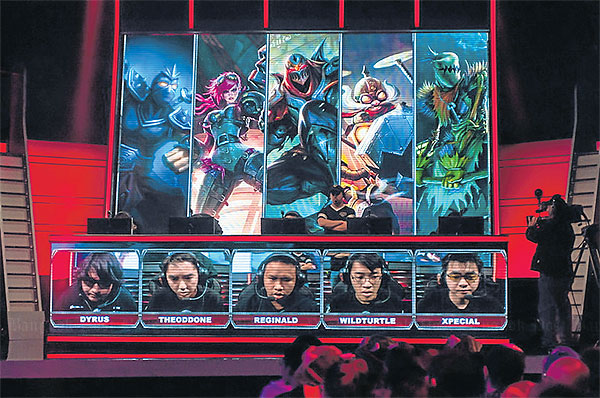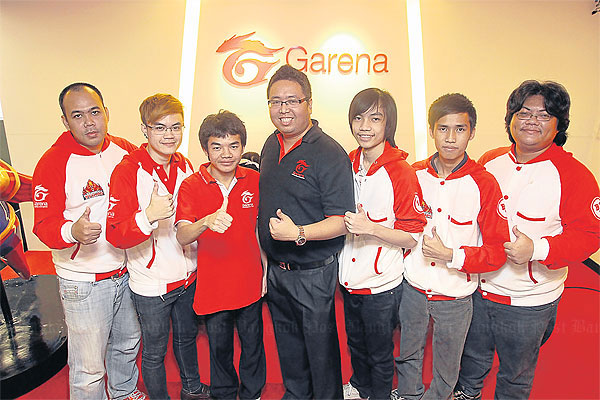
The playoffs for the League Of Legends world championship (Season 3) were held in the US, with the grand finals being hosted recently by the Staples Centre in Los Angeles. The winning team, SK Telecom T1 from Korea, took home more than 31 million baht in prize money.
The large prizes now up for grabs at international video game contests are encouraging some Thai youngsters to turn what was a mere hobby into a full-time occupation
Those who view video game addiction with alarm may have to review their attitudes now that a small group of Thai youngsters have grown up to make a career out of their favourite pastime and are now managing to earn a living in the world of e-sport.
Now 33 and manager of a team of online gamers called Bangkok Titans, Sukij Nonta has represented Thailand in several international e-sport tournaments. He started playing video games when he was 14 and said he "turned pro" in 1998. A year later he won a local championship and went on to represent the Kingdom at the Counter Strike "shooter games" in South Korea.
Even while he was studying at university for a degree in civil engineering, Sukij continued gaming in his free time and after graduation he found a job he knew he would really enjoy _ with a magazine dedicated to online games. He went on to represent Thailand at Counter Strike finals in Korea for three consecutive years, 2001 to 2003.
It was around this time that computer games first started to become immensely popular around the world, a boom period when "net cafes" mushroomed in Thailand, opening up even in the smallest of towns. Sukij formed his own team of junior players at his local internet cafe and they went on to win the World Cyber Games, one of the biggest events on the online gamer circuit at that time.
For Sukij and his team-mates, computer games were not only fun, they could be financially rewarding. Top prizes for contests held at internet cafes range from 5,000 to 10,000 baht, but the first prize for bigger events hosted at department stores can be as much as 30,000 to 50,000 baht.
"E-sport players are comparable to football players," Sukij said, "our mental agility and physical reaction time slows down as we get older. The peak period for a gamer is usually between 15 and 25 years of age."
In many other countries, he insisted, people take a career in gaming as seriously as they would a job in the football leagues. While e-sport in Thailand has been growing rapidly, the number of "professional" gamers is still small _ most players still treat this activity as a hobby or as a second job and so the teams that represent Thailand abroad are mostly made up of semi-professionals.
Surprisingly, many of the most talented players live in rural areas and are often youngsters who have just finished school and are mulling a career as a full-time gamer. Sakolkorn Sakavee is CEO and vice-president of Garena Online (Thailand), a company that prepares local gamers for e-sport competitions at both the national and international level. Bangkok Titans, the team that Sukij currently manages, is a creation of Garena Online and the model on which three additional professional teams are being based. In a sign of the increasing level of global competitiveness in this field, Garena (whose parent company is based in Singapore) is now importing experts from Europe to work with Thai players in order to prepare them to compete at the world championships in Sweden this year of a game called Heroes Of Newerth.
"Garena is the first company to groom professional e-sport players," Sakolkorn explained. "Players get a regular salary and bonuses. The minimum wage is around 20,000 baht per month. Those who work part-time are paid on a part-time basis."

Online gamers the Bangkok Titans with team manager Sukij Nonta, left, and Sakolkorn Sakavee, centre, CEO of Garena Online (Thailand).
Similar to professional athletes, e-sport gamers have a daily practice schedule, starting at 9am with classes in everything from fitness to strategy. To train its Thai players, Garena has hired the Vietnamese coach who led a team from that country to victory in last year's League Of Legends championships. Again, the resemblance to professional football, and its use of foreign coaches, is obvious.
The Garena CEO noted that the base rules for online gaming have changed dramatically of late. The time required to finish a game has been reduced from the previous four or five hours to a mere 45 minutes or half-an-hour. Most contests are still based on PC platforms, but as time goes by and 3G and 4G mobile-phone networks become more established, Sakolkorn envisages the possibility of competitions being held involving players who are on the move.
"E-sport is the other side of game addiction," he declared. "We are now trying to show the positive aspect of online games. Some competitions _ Heroes Of Newerth for example _ give out first prizes that are worth the equivalent of 1 million baht.
"That means that each team member can take home 200,000 baht. The potential income is promising and it is encouraging more people to enter the e-sport arena, But for very young players, their participation is, of course, conditional on them first getting approval from their parents."
Apart from Thailand, the Singapore-based Garena, which describes itself as an online gaming service provider, has a presence in Taiwan, Vietnam, the Philippines and Indonesia. In Thailand, the company is the exclusive distributor of the online, multiplayer, battle-arena games League Of Legends, Heroes Of Newerth and Point Blank, and the football game FIFA Online 3.
comments powered by Disqus

